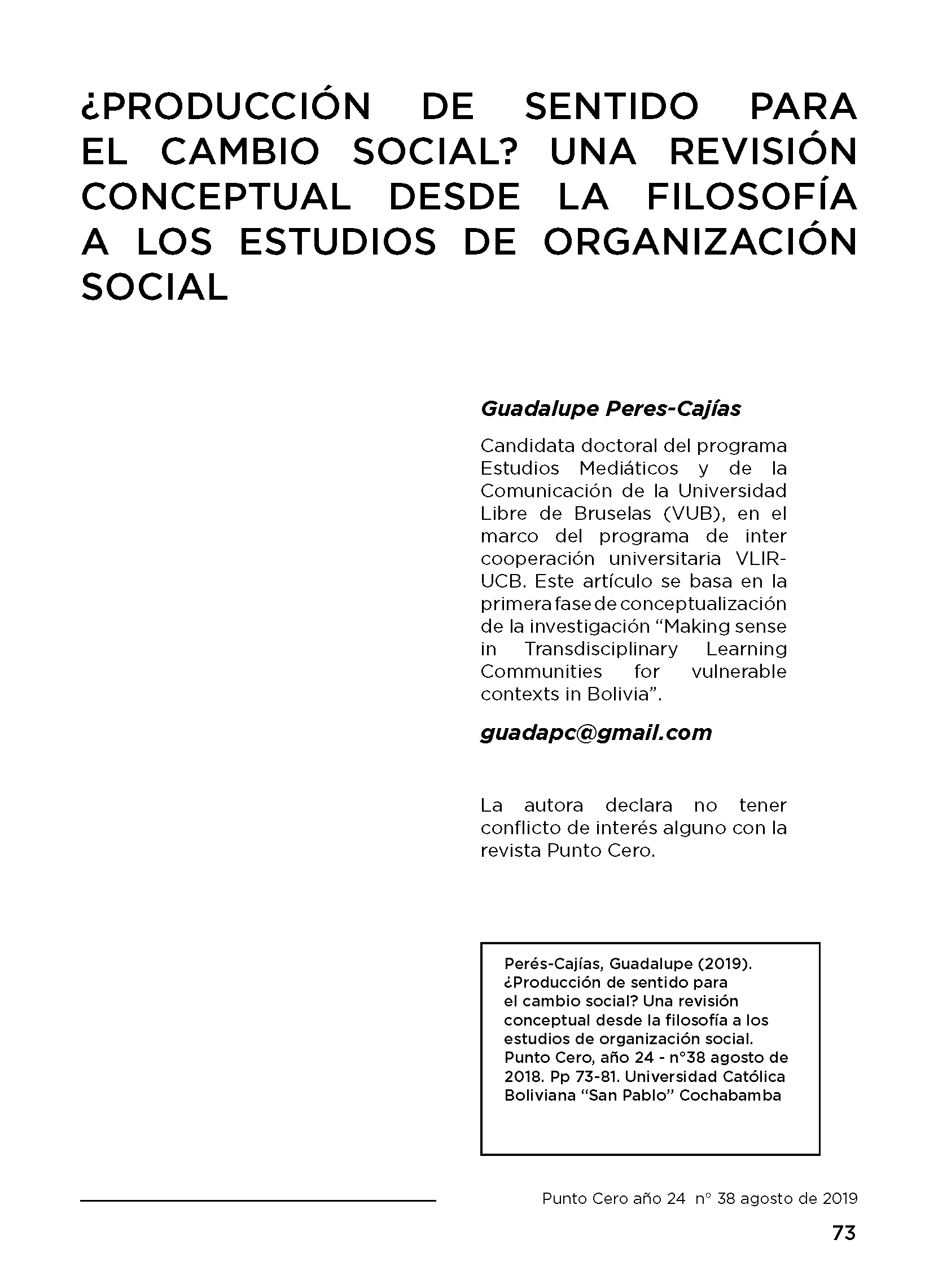¿Making sense for social change? A theoretical approach from phylosophy to organization studies
DOI:
https://doi.org/10.35319/puntocero.20193837Keywords:
Making Sense, Communication, Social ChangeAbstract
Making sense has been quite argued in Latin American Studies in Social Communication. Since Jesús Martin Barbero introduced his text “De los medios a las mediaciones” (1989), sense has started a complex and struggled path for being assumed as the object of study in Communication. However, its applicability has been limited to an only area of this domain: cultural process. Nevertheless, as it will be presented in this paper, is possible to apply this category for understand and promote social change process, because of the theoretical conditions within sense making has been developed. In order to do so, it will be presented a review on the philosophical basis of this concept (hermeneutics and phenomenology), going through Latin American studies in Communication, to conclude with the incomes of organizational and communitarian studies. Thus, expand the common understanding about sense making for new research interest by answering to the question: how making sense has been related with social change?
References
Berger P. y Luckmann T. (1966). The Social Construction of Reality. A Treatise in the Sociology of Knowledge. England:
Penguin Books Burgis-Kasthala, M. L. (2014). Over-stating palestine’s UN membership bid? An ethnographic study on the narratives of statehood. European Journal of international Law 25 (3), pp. 677-701.
Coffey, A. and Atkinson, P. (2003). Encontrar el sentido a los datos cualitativos. Estrategias complementarias de investigación. Medellín: Universidad de Antioquia.
Frantzeskaki, N. and Rock, a. (2018). Co-producing urban sustainability transitions knowledge with community, policy and science. Environmental and Societal Transitions 29 (2018) 47-51.
Fuentes, R. (2002). Comunicación, Cultura, Sociedad: Fundamentos conceptuales de la postdisciplinaridad. Buenos Aires: Universidad Nacional de la Plata.
Gadamer, H. ((1975) 1993). Verdad y método. Hermenia 7. Fundamentos de una hermenéutica filosófica Quinta edición. Salamanca: Ediciones Sígueme.
Gadamer, H. ((1965) 1991). La actualidad de lo bello. Barcelona: Paidós.
Habermas, J. (1989). “Teoría de la acción comunicativa: Complementos y estudios previos”. Madrid: Cátedra.
Ito, K. and Inohara, T. (2015). A model of sense-making process for adapting new organizational settings, based on case study of executive leaders in work transitions. Procedia- Social and Behavioral Sciences 172 (p. 142-149).
González, J. (1994). Más (+) cultura (s) Ensayos sobre realidades plurales. México: Consejo Nacional para las Culturas y las Artes.
Landowski, E. (1999). La mirada Implicada. Revista Anthropos. Número: 186. Dedicado a: Semiología crítica: De la historia del sentido al sentido de la historia. P. 37-56.
Martín Barbero, J. ((1989)2001). De los Medios a las Mediaciones. Editorial Gustavo Gili. Barcelona- España.
Ricoeur, P. (2003). El Conflicto de las interpretaciones. Ensayos de Hermenéutica. Buenos Aires: Fondo de Cultura Económica.
Ricoeur, P. (1987). Tiempo y Narración. Madrid-España: Ediciones Cristiandad.
Santos, E. (2006). Constructing meanings for social development through relational practices. “The ACORDES process”. Belgium: Ku Leuven.
Stapleton, K., Wilson, J. (2017) Telling the story: Meaning making in a community narrative Journal of Pragmatics, 108, pp. 60-80.
Verón, E. (1996). La Semiosis Social. Fragmentos de una teoría de la discursividad. Barcelona: Editorial Gedisa.
Weber, K. and Glynn, M. (2006). Making Sense with Institutions: Context, Though and Action in Karl Weick’s Theory. Organization Studies 27(11): 1639-1660. London: SAGE Publications.
Weick, K. (2005). Managing the unexpected: Complexity as Distributed Sensemaking. UC54. Pp 51-65.
Weick, K. (2006). Faith, Evidence and Action: Better Guesses in and Unknowable World. Organization Studies 27 (11):17231736. Sage Publications.

Downloads
Published
How to Cite
Issue
Section
License
Copyright (c) 2019 Revista Punto Cero

This work is licensed under a Creative Commons Attribution-NonCommercial 4.0 International License.








